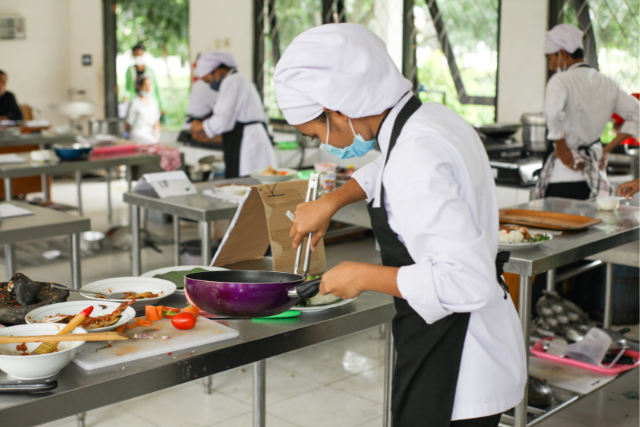
The culinary world constantly evolves, with new dietary trends influencing food preparation and enjoyment. From the rise of plant-based eating to a stronger focus on sustainability, chefs must adapt while maintaining quality and flavor.
Culinary arts training, like the programs at CCA Manila, helps chefs build the skills to keep up with these changes. Learning traditional techniques is important, but refining and reimagining them for modern tastes is just as essential. Creating plant-based versions of classic dishes or finding more sustainable ingredients sources requires skill and creativity.
Let’s take a closer look at how training helps chefs stay ahead in an ever-changing industry.
The Importance of Adaptability in the Kitchen
Food trends change fast. One year, keto and paleo diets are everywhere; the next, it’s all about fermented foods and plant-based proteins. A solid culinary education teaches chefs more than technical skills—it teaches them how to adapt.
A well-rounded cooking course introduces chefs to different cuisines and dietary needs, helping them create dishes that appeal to an array of tastes. Swapping ingredients for healthier alternatives or adding global flavors keeps things fresh and exciting.
Understanding Consumer Diet Trends

One of the biggest challenges chefs face is staying informed about what diners want. Food trends aren’t just passing fads—they often stem from health concerns, sustainability efforts, or cultural influences. Culinary training, such as what CCA Manila provides, helps chefs research, analyze, and apply these trends to keep their dishes relevant. A strong foundation allows them to balance creativity with practicality, ensuring that new ideas fit within restaurant operations while meeting consumer expectations.
Key trends shaping the culinary world include:
- Plant-Based Eating – The demand for vegan and vegetarian options grows, driven by health-conscious diners and sustainability concerns. Consumers are looking for plant-based dishes that are nutritious, rich in flavor, and satisfying. Chefs trained at culinary schools like CCA Manila develop the skills to work with a wide range of plant-based ingredients, transforming vegetables, legumes, and grains into well-balanced, delicious meals rather than simply omitting meat from a dish.
Techniques such as fermentation, smoking, and umami layering help chefs enhance flavors, ensuring that plant-based meals are as complex and appealing as their meat-based counterparts. For instance, a chef might use smoked eggplant or mushrooms to replicate the deep, savory notes in grilled meats.
Ingredients like miso, nutritional yeast, and dried seaweed can add layers of umami, creating depth in dishes such as vegan ramen or dairy-free cheese alternatives. Fermentation techniques, like making kimchi or tempeh, boost flavor and improve digestibility and nutritional value.
- Sustainable Dining – Consumers are becoming more mindful of where their food comes from and how it impacts the environment. They seek ethically sourced ingredients, zero-waste cooking, and farm-to-table experiences. Training at CCA Manila helps you understand responsible sourcing, food waste reduction, and menu development that aligns with sustainability values.
- Health-Conscious Choices – More diners seek meals that align with specific health needs, such as gluten-free, low-carb, or allergen-friendly options. A well-trained chef understands how to make adjustments without sacrificing flavor or texture. Using alternative flours, natural sweeteners, and nutrient-dense ingredients, they can create dishes that cater to different dietary requirements while maintaining the dish’s integrity.
- Global Influences—Thanks to travel, social media, and cultural exchange, diners today have more exposure to international cuisines than ever before. This has sparked an interest in bold, authentic flavors worldwide. Culinary courses introduce chefs to a variety of global cooking styles, spices, and techniques, allowing them to thoughtfully incorporate new flavors into their menus while respecting culinary traditions.
How Culinary School Prepares Chefs for Emerging Food Preferences

- Teaches Global Cuisine Integration – Exposure to diverse culinary traditions allows chefs to incorporate international flavors and techniques into their menus. This helps them create dishes that appeal to a wide range of tastes while respecting the authenticity of different cuisines.
- Encourages Sustainability Practices – Training emphasizes responsible ingredient sourcing, reducing food waste, and selecting seasonal produce. By learning how to maximize ingredients and minimize waste, chefs align their practices with growing consumer demand for ethical and environmentally friendly dining options.
- Refines Cooking Techniques – Hands-on experience with methods like fermentation, plant-based cooking, and alternative food preparations equips chefs with the skills to elevate their dishes. Mastering these techniques ensures they can adapt to new dietary preferences without compromising quality.
Culinary Arts Courses at CCA Manila: Equipping Chefs for Evolving Consumer Diets
Professional Chef Program
With dietary trends evolving rapidly, chefs need a solid understanding of fundamental techniques that can be applied across various cuisines and nutritional requirements. The Professional Chef program, developed in partnership with Rouxbe Online Culinary School, provides theoretical and practical training suited for hospitality graduates, industry professionals seeking certification, and those looking for a flexible learning experience. As more chefs turn to online resources for education, this cooking class ensures they stay informed and skilled in adapting to current food trends.
Fundamentals in Culinary Arts
As more people seek plant-based, gluten-free, and health-conscious options, chefs must be prepared to adjust recipes while maintaining depth of flavor and texture. This 80-hour intensive program builds essential culinary skills while introducing students to ingredient substitutions, alternative cooking methods, and the art of balancing nutrition with taste. Each session concludes with a group tasting and critique, helping students refine their ability to meet diverse consumer preferences.
Diploma in Culinary Arts & Technology Management
With sustainability and dietary awareness influencing dining choices, chefs need more than just cooking expertise. The Diploma in Culinary Arts & Technology Management provides hands-on training in culinary techniques while incorporating essential business and food service management skills. Students learn how to design menus that reflect changing consumer priorities, implement sustainable kitchen practices, and develop the adaptability needed to succeed in an industry driven by shifting dietary trends.
Train with the Pros at CCA Manila!
At CCA Manila, we give chefs the skills to keep up with today’s ever-changing food scene. Each lesson blends practical techniques, smart ingredient choices, sustainability, and creative menu development.
With a mix of traditional methods and modern culinary innovations, we help chefs create dishes that match shifting dietary fads without losing flavor, presentation, or efficiency. Whether it’s plant-based dining, mindful sourcing, or the push for healthier options, the right training makes all the difference.
The food world isn’t slowing down, and neither should you. Enroll with us at CCA Manila and gain the skills to stay ahead, create confidently, and cook for the future!
